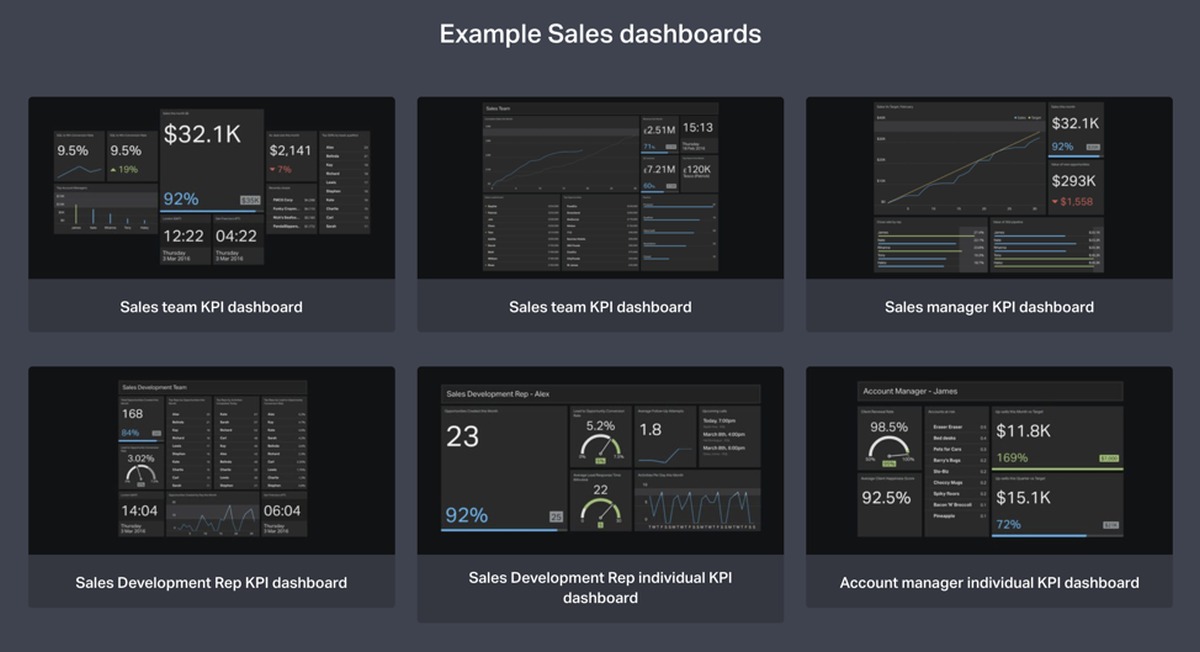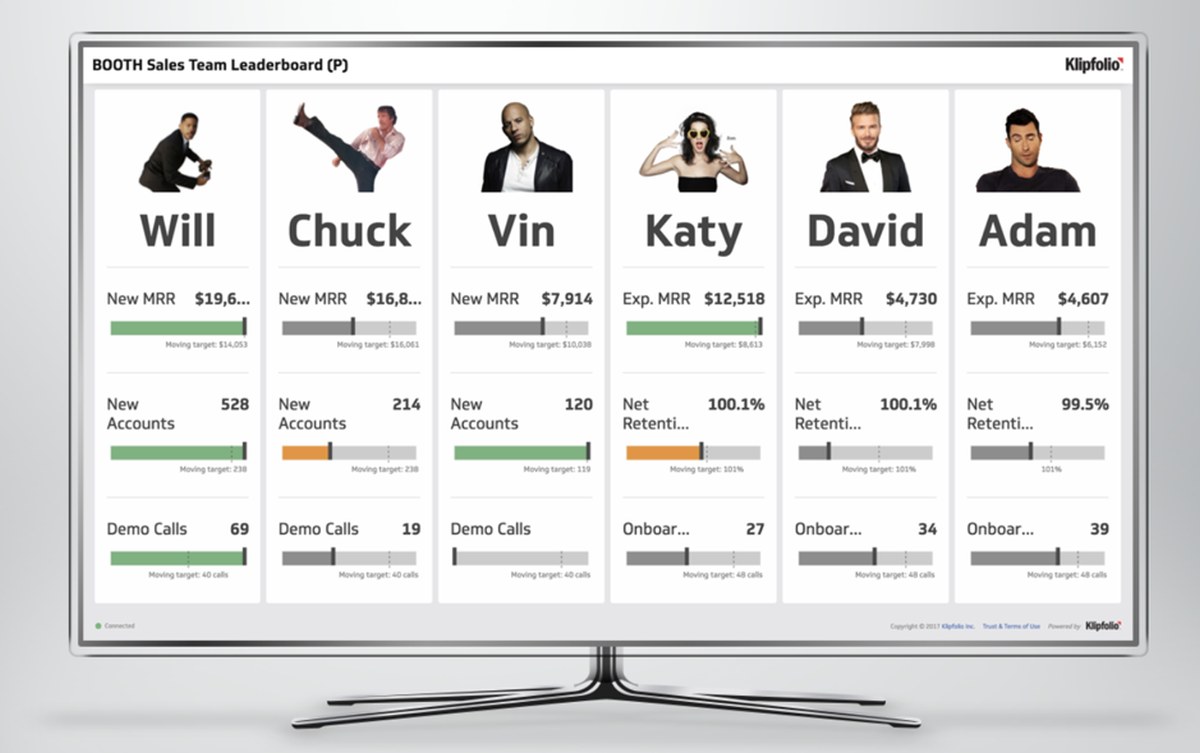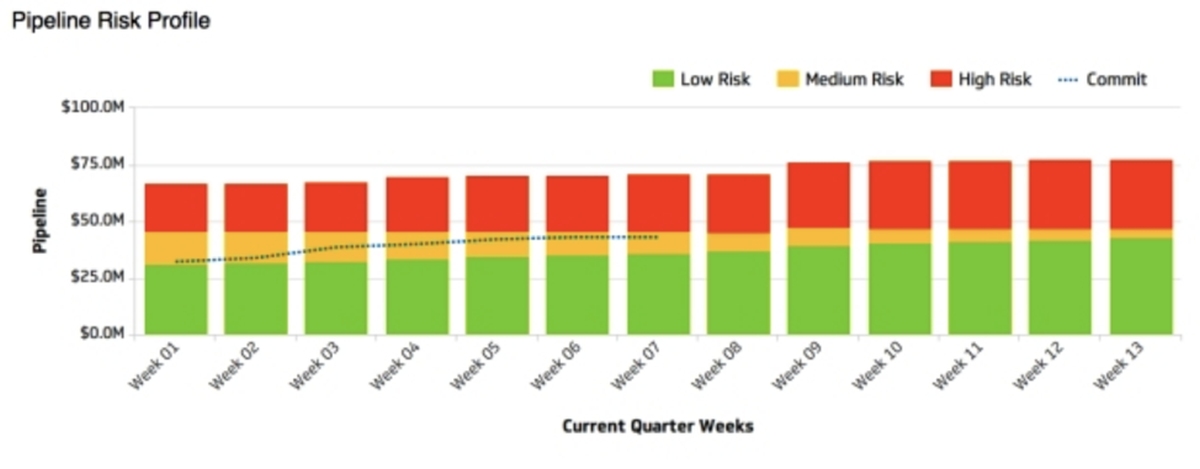How To Optimize Team Performance With Sales Dashboards
Every sales manager strives to motivate their people to improve their team performance. The question is, what’s the best data-driven approach to help you drive this constant improvement?
In this article:
- How Dashboards Can Help Team Effectiveness
- Five Ways to Utilize a Sales Dashboard to Help Team Members Achieve their Goals
Boosting Team Performance with Sales Dashboards
How Dashboards Can Help Team Effectiveness

Sales managers always look for different ways to improve work performance. They can utilize sales tools, conduct trainings, and perform other goal-setting activities. But what’s the most effective way to create high-performing teams?
Sales dashboards offer a simple, effective way to motivate and lead teams. They help you share important sales metrics with your team in real-time.
These include:
- Sales per month
- Revenue-per-rep
- Pipeline changes and
- Dials-per-rep
Visualize your sales data to encourage friendly competition between team members. A sales dashboard can also identify which areas of your sales process need optimization.
In the image below, Geckoboard provided some examples of how to visualize the performance of your sales organization:

Geckoboard sales dashboard examples
Five Ways to Utilize a Sales Dashboard to Help Team Members Achieve their Goals
In this article, I’ll dive into five ways you can use sales dashboards to propel your sales team towards their goals:
1. Celebrate Key Sales Metrics
Sales managers should celebrate the successes of each individual rep along with the overall team—especially when you have data to back it up. Make a note of the following activities and metrics when reviewing your team.
Each sales team member would have been successful when:
- Quota is attained
- The average conversion rate increases
- The deal size amount increases
Meanwhile, an effective team would be successful when:
- Average revenue goes up
- Percentage of new business increases
- Average conversion or win rate increases
- X percentage of sales reps are hitting their quota
Why should you celebrate both individual and team performance?
This shows appreciation for individual accomplishments and also accounts for the overall team goals. It also ensures everyone is working towards the same goals.
2. Spark Friendly “Sales Competitions”
Hungry, assertive sales reps love using their personal sales dashboards as a way to quickly see their progress for the month. They also use it to find out whether they’ll hit their sales target that month.
As a sales manager, you can create a “sales leaderboard” section within your sales organization’s dashboard.
Klipfolio shows how a sales leaderboard can track both individual and team performance across metrics. These metrics include New MRR, New Accounts, Demo Calls, Expansion MRR, Retention and Onboarding Calls:

Sales dashboard showing team leaderboards
Many companies display sales leaderboard data in an open environment or on a live TV, visible to everyone within the organization.
With the sales leaderboard data, you can create friendly competitions with your sales reps. These can include:
- A $300 monthly cash prize for the sales rep with the most New MRR, along with smaller prizes for the 2nd and 3rd place sales reps.
- Tickets to raffle prizes based on desired outcomes and selling behaviors. The more tickets a sales rep gets, the more likely they are to win one of the prizes.
- Incentivizing random daily prizes for the highest daily performers on the leaderboard. This way everyone has a good chance of winning a prize.
- Creating a sports-style bracket around weekly and monthly goals while still giving honorable mentions to those who performed well but didn’t make it until the end.
Through these friendly sales competition ideas, you’ll have a more engaged and motivated team ready to problem solve and drive forward revenue creatively.
What is New MRR? This is the additional sales and revenues generated from new customers acquired.
3. Use Historical Data to Set New Objectives
Instead of relying on intuition and calculations on the fly, sales managers can use sales dashboards to create an accurate picture of sales performance across any period of time:

Sales dashboard showing historical data
They can then use this historical data to set new goals for their sales teams and predict the likelihood of desired outcomes.
The call to deal ratio is a good example of an area where it’s always important for sales reps to improve. It traditionally takes the average sales rep 100 calls to close 10 deals, and they can still strive to nudge up that conversion rate.
Let’s say your two top-performing salespeople are able to close at 30 deals per 100 calls. You could incentivize the rest of the sales team with sales competitions and new training to get the average call to deal ratio to 20 deals closed for every 100 calls.
This could potentially double your call to deal ratio and increase overall new accounts.
RELATED: How To Discipline Your Sales Data
4. Use Data to be Transparent with Progress and Challenges

Sales team reviewing performance
While everyone loves to show what’s working within a sales team, it’s just as important to use dashboards to show what’s not working. Using the data from the dashboard, reviewing each team member’s work for that month will be more objective for the performance appraisal process.
When you can easily diagnose issues in the sales pipeline, you’ll find it so much easier to come up with solutions on how to fix them. These issues can include sales funnel leakage, low MRR or, most commonly – an underperforming sales rep.
After evaluating why a sales rep isn’t performing well, sales managers can take action to clarify expectations, provide necessary feedback, address performance gaps, and focus on the actions to be taken for performance gains.
Another strategy is to pair low performers with high performers with the mindset that the high performer coaches the low performer on the best practices. With the right amount of coaching, underperforming reps can turn their performance around.
5. Provide Reps with Data and Encourage Autonomy
Each sales rep on your team is different in their motivations, strengths, and personalities. One way to empower reps is to provide them with the dashboard data but let them decide on how they will take action to hit new objectives.
For example, if the goal is to reach an increased $50,000 in New MRR per rep each month, then the channel to get there could vary from person to person. One rep can quickly get to $50,000 in New MRR by closing 20 deals through 200 cold calls. Meanwhile, for another rep, it may be easier to close 20 deals from 200 cold emails sent.
Acknowledging and nurturing these individual selling strengths can be the key to a diverse and empowered sales team that consistently hits their targets.
Use your sales dashboards to motivate, troubleshoot, and optimize.
When you customize a sales dashboard around your sales team’s goals, it will provide an up-to-date snapshot of your organization’s overall sales data of what’s working and what’s not working. You can use this data to proactively fix any leaky parts that need improvement and help any reps that need their performance gaps addressed.
But best of all, as mentioned in this article, you can use dashboards to encourage more engagement and motivation for sales reps to level up their game.
How do you measure team performance? Share the tools and methods you use in the comments section below!
Up Next: 5 Strategies for More Accurate Sales Forecasting

